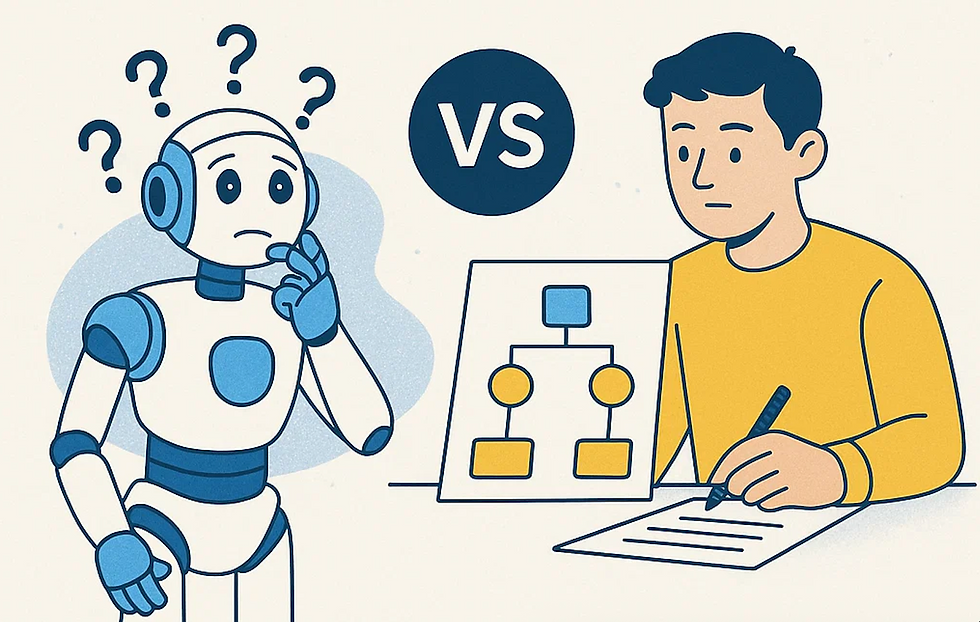Artificial intelligence in European defense: Deciding better, deciding in time.
- Jaime Parra
- Apr 1, 2024
- 3 min read
In the era of multi-domain conflicts and over-information, deciding is no longer enough: we must decide better, and above all, decide in time.

Europe, and Spain in particular, is no stranger to this technological change. Modern armies can no longer rely solely on the intuition of the person in command or on traditional hierarchical channels. Modern warfare is multi-channel, multi-domain and multi-target. It requires platforms that synthesize information in real time, detect patterns invisible to the human eye and propose courses of action based on reliable data. It requires, in other words, decision support systems.
At SKIOS we are working on solutions that point precisely in this direction: platforms that support decision making in critical environments, under uncertainty, and with a strong tactical-operational component. However, this article is not a promotion, but a call to think collectively about the challenges and opportunities that this technology poses.
AI is already on the move: from the labs to the theater of operations
We are no longer talking about futures. AI is already being used in various fields: automatic surveillance systems, open source intelligence analysis (OSINT), cyberdefense management, predictive logistics and scenario analysis... In Spain, the Ministry of Defense has defined an AI adoption strategy focused on specific use cases, including decision support. Projects such as ABIDE (Artificial Intelligence and Big Data for Decision Making in C4ISR), promoted by the European Defense Agency, show that AI in European defense is no longer theory: it is practice in consolidation.
In this context, programs such as ReArmEurope/Readiness 2030 underline the urgency of strengthening the European industrial and technological base. This ambitious program promotes rapid and autonomous response capabilities in the face of increasingly emerging threats on the old continent, which makes it essential to have locally developed, auditable AI solutions adapted to our doctrines. The integration of advanced technologies in command and control (C2) systems thus becomes a key axis to achieve the levels of technological readiness and autonomy that these programs pursue.
Technological sovereignty as a strategic requirement.
The benefits are obvious: better analysis, shorter reaction time, greater accuracy in threat assessment and greater adaptability. But there is no innocent technology. Military AI poses ethical dilemmas (such as lethal autonomy), tactical risks (such as model manipulation by hostile actors) and strategic challenges (such as algorithmic escalation in high-tension conflicts).
Practical problems also arise: what to do when an intelligent system gives a recommendation that contradicts the commanding officer's intuition? What is the real traceability of an automated decision? How do we train the new generations of commanders to live with these tools without losing human judgment?
NATO, for its part, has proposed principles for the development of responsible AI: legality, governance, traceability, reliability, mitigation of bias. These are a necessary, but not sufficient, basis. The discussion must also be doctrinal, educational and cultural.
Europe, between opportunity and obligation.
In the current strategic environment, marked by the war in Ukraine, Russian rearmament and increased military spending across Europe, innovating is not an option. But neither is innovating without clear rules. Artificial intelligence represents an opportunity to strengthen our defense capabilities, but we also have a moral and strategic obligation to get it right, in our own way, with our European values.
From SKIOS we believe that this is the right direction: to build intelligent systems that do not replace human decision, but enhance it. That do not disconnect the command from the field, but give them better tools to act with more information and less uncertainty, mitigating risks.
Because in defense, as in democracy, to decide is not only to choose. It is to assume consequences. And on that path, technology can be an ally or a threat. We work to ensure that it is the former.



Comments